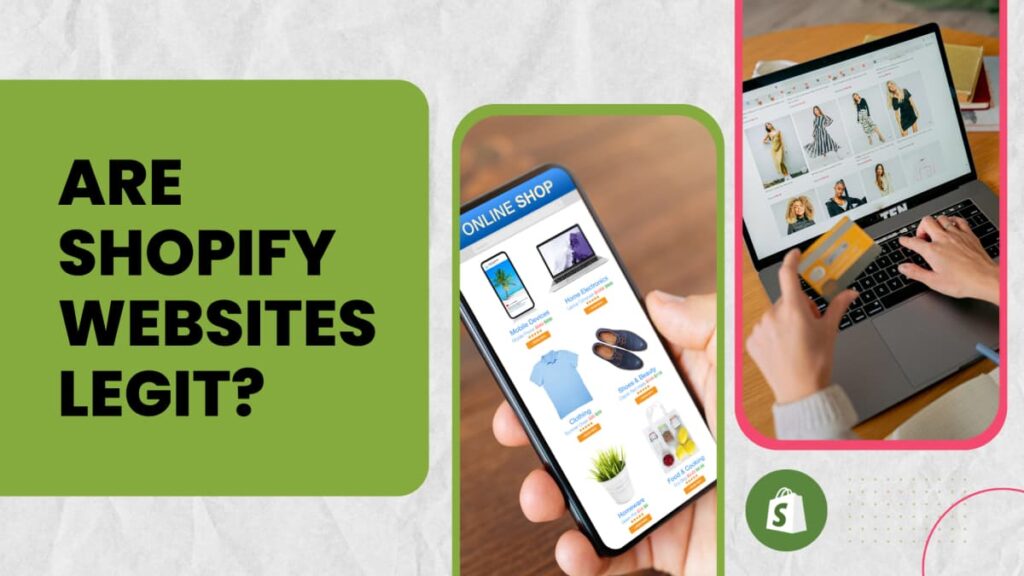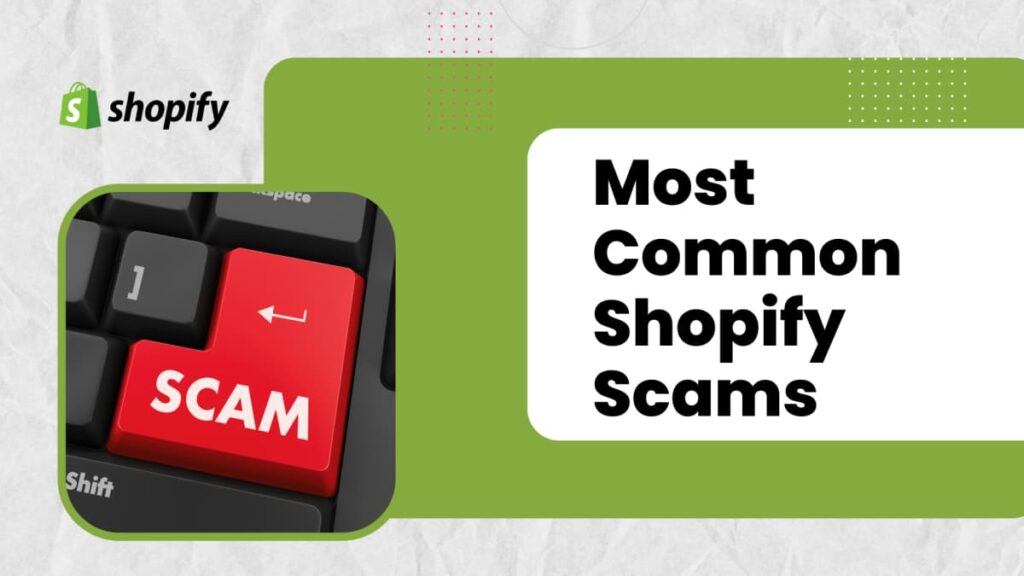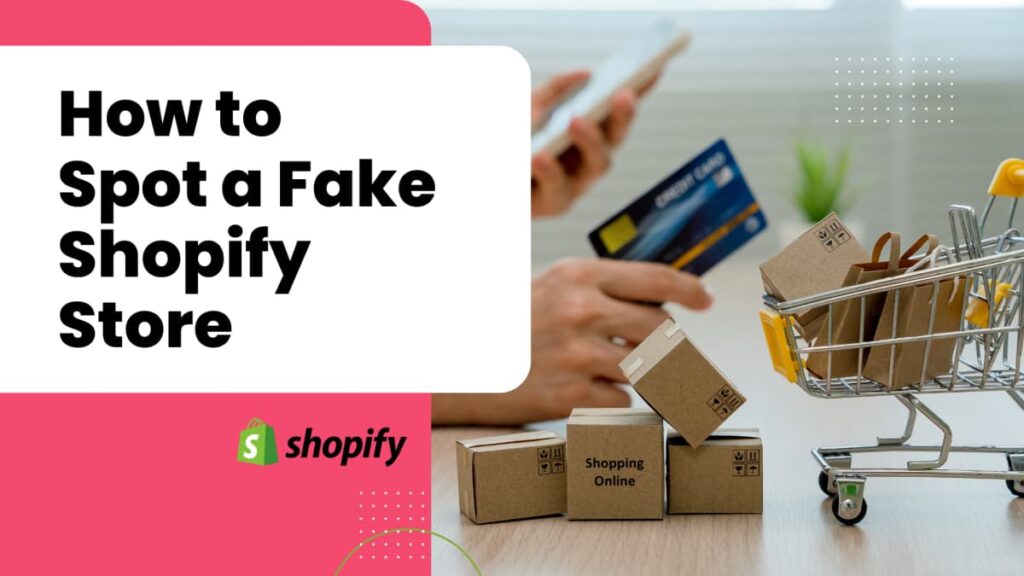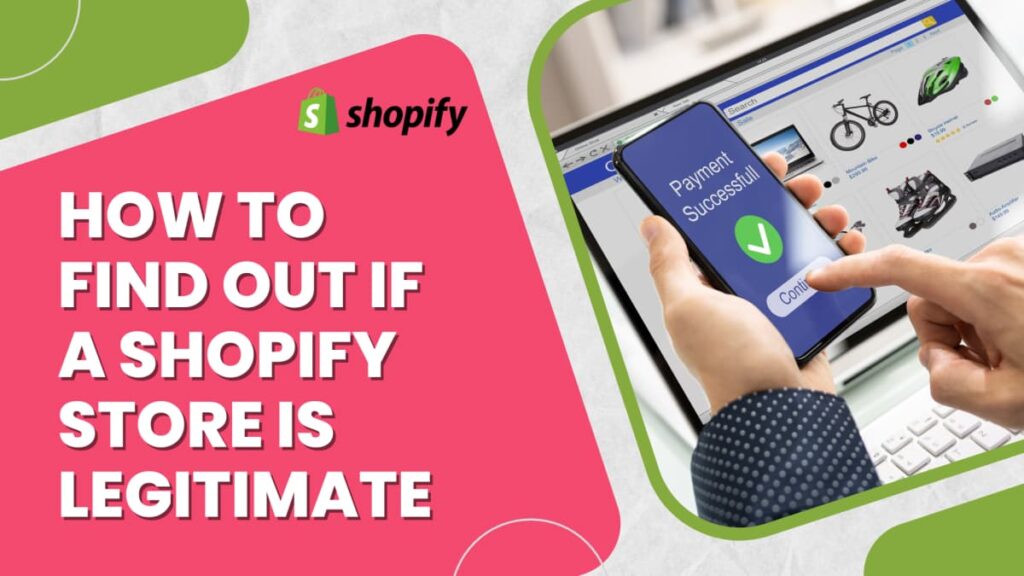Shopify rewrote the rules of retail. It now allows anyone to create an online store, as the infrastructure has become accessible to anyone looking for a space to sell their product.
Millions of businesses with different profiles from countries worldwide use this platform to develop their online sales. Shopify fills the void, but is Shopify legitimate?
Shopify itself is well-known and secure, though because of its popularity, there are always going to be groups trying to take advantage of the platform’s user-friendliness to copy legitimate businesses.
Identifying the genuine ones is the only way to stay safe out there.
This article will give you the tips you need to identify legit Shopify stores and how to avoid common scams.
Are Shopify Websites Legit?

Yes, Shopify is a safe and secure platform. It’s used by millions of businesses worldwide – from small startups to large enterprises.
The platform provides an extensive set of tools and software to assist merchants in fully prospering in the online marketplace. Although Shopify is designed with the strongest security measures on the market, the truth is that scams are still out there and can cause issues.
Shopify is a trusted and widely-used e-commerce platform that empowers businesses to build secure, professional online stores, all backed by industry-leading security and reliability.
Shopify’s commitment to legitimacy shines through in its features. Here are 5 reasons why Shopify is a legitimate ecommerce platform.
5 Reasons Why Shopify Is a Legitimate Platform

Secure Transactions
Shopify uses state-of-the-art encryption technology to safeguard data transfers and keep financial details secure from unauthorized access. This security guarantee facilitates the establishment of a trustworthy environment where customers can shop without worrying if their vital information is being compromised – no more sleepless nights.
SSL Certificates
Every Shopify store includes a secure socket layer (SSL) certificate that encrypts data and ensures server authentication assurance, and in return, it increases your confidence as a shopper. You can easily view the presence of the SSL Certificate in the browser’s address bar in the form of a padlock icon.
Fraud Prevention
Shopify has a suite of tools to locate and notify both merchants and customers about fraudulent transaction behavior in order to keep the shopping environment secure. This is exactly how Shopify guarantees a safe shopping experience for every user.
24/7 Support
Shopify has round-the-clock customer service, ready to instantly handle any technical, billing, or any other concerns you might have. This is amazing, as it offers you peace of mind, knowing that just one call or one button press is what it takes to have support.
Data Protection
Shopify has built its data collection policies in a way that ensures compliance with international privacy laws across the globe. They’re completely transparent regarding data collection. This transparency helps them build trust with users. You can rest assured that your personal and business information is treated with the highest degree of professionalism and confidentiality.
Are There Scams on Shopify?
Yes, even though Shopify is a stable and safe platform that relies on a range of security measures, scams can occur, and there’s no one else to blame but scammers.
While Shopify actively takes measures against them, some scammers can slip through and create fraudulent stores.
These stores might offer extremely low prices, fake products, or aim to steal your payment information. And these scams can lead to financial loss, and even damage to a brand’s reputation if scammers imitate a well-known business.
It’s important to be aware of some of the common scams that exist on Shopify, just as they can on any large online platform. Here’s what you need to know:
The 5 Most Common Shopify Scams

Fake or Duplicate Stores
These websites masquerade as legitimate companies with fake logos, layouts, and product descriptions to produce a convincing online presence, enough to deceive shoppers. Under the cover of anonymity, you, as a consumer, are likely to buy a product believing it’s from a well-known brand when, in fact, you’re purchasing a fake product or worse – nothing at all.
Bait-and-Switch Tactics
This tactic involves a scammer advertising a product at a surprisingly low price to draw in buyers. However, once a customer shows interest or even after they make a purchase, the product suddenly becomes “unavailable’’. The seller then pushes for a more expensive or inferior substitute, which completely undermines trust in online shopping.
Triangulation Schemes
This type of scam involves three parties – the scammer, the unsuspecting customer, and a legitimate store that becomes collateral damage. Basically, scammers create fake stores to obtain credit card information from customers who are under the impression they’re buying an item from legit websites. You will get the item as soon as scammers order it, but at what cost? The legitimate store will suffer financial loss, while your personal data will be compromised.
Phishing Attempts
These happen when scammers send emails or display ads that precisely mimic official Shopify information. The emails or the ads often contain a clickable link that leads to phishing sites where, if not well-informed, you can be tricked into revealing personal information or login credentials. The phishing scam directly targets your personal information.
Unrealistic Discounts and Promotions
More often than not, a fake website would use extremely low prices on high-demand items that are too good to be true to capture credit card information. Unfortunately, shoppers drawn in by the charm of a great deal can end up compromising their financial security.
6 Methods to Spot a Fake Shopify Store

While you can usually be confident that a Shopify store for the most part is legitimate, knowing how to distinguish a real store from a fake one is essential. So, let’s go over a few ways you can do so.
Check for Secure Connections
Before you enter any personal or payment information, always make sure that the website is using a secure connection. Look for the lock symbol in your browser’s address bar; this symbol indicates that the site has an HTTPS connection secured by an SSL certificate.
Shopify provides SSL certificates to all its stores as a standard feature. That said, a missing lock icon is a big red flag, possibly indicating that you’re not dealing with a legitimate website.
Review the “About Us” and “Contact Us” Sections
Real businesses usually provide very detailed information in the “About Us” and “Contact Us” sections regarding their mission, history, and the staff behind the products they offer. You can get in touch with them using phone numbers, email addresses, and physical addresses. Be wary if these details are vague or absent.
Look for Customer Reviews
Customer reviews can be a goldmine of information regarding the credibility of a store. Check both on-site and external reviews. Real reviews vary in detail and tone, so be wary of stores with weirdly glowing or very generic reviews, as they’re probably not written by a real customer.
Examine Product Descriptions and Images
High-quality images with well-written, informative product descriptions are evidence of a legitimate online store. They reflect an investment in customer experience and a detail-oriented outlook. On the other hand, poor-quality images and descriptions with a lot of grammatical errors may indicate that the store is fake.
Research the Brand or Product Independently
Go deeper and review more details about the brand or its particular products. A genuine brand usually has a digital footprint that extends beyond its website – mentions in industry publications, reviews on other e-commerce platforms, and discussions on social media. A lack of information or presence outside their site may be a warning sign you needn’t overlook.
Check the Brand’s Social Media
A true-blue brand normally has active social media pages, where they post quite often and interact with customers. These platforms are meant to facilitate conversations with customers, showcase products, and express their values. On the other hand, scam stores may have social media profiles with low activity, few followers, or no real customer interactions.
How to Spot a Fake Shopify Store Using Koala Inspector
Our custom Shopify spy tool the Koala Inspector is designed in a way that makes it easy to analyze Shopify stores. While it’s not the tool’s primary function, you can use it to help you determine the legitimacy and operational standards of these businesses.
By overviewing different aspects of a store, such as theme, traffic, sales data, and advertising efforts, you, as a potential customer, can make an informed decision about where to order safely.
Below are detailed steps on how to use Koala Inspector to spot potential red flags.
Check if They Use a Custom or Paid Theme
One indicator of a legitimate Shopify store is the use of a custom or paid theme. A paid theme or custom built theme offers a more professional look and feel, which suggests that the store owner has invested in creating a good online presence.
A store using a free theme is either new to the market or it could indicate this is a website that plans to churn and burn.
With Koala Inspector, you can quickly determine whether a store is using a free or paid theme.
Check the Store Traffic
Store traffic is essential for assessing the popularity and trustworthiness of one store. Koala Inspector allows you to check the traffic data, giving you inside information about how many people are visiting the store and where the traffic comes from. A lack of traffic is suspicious, as are unnatural traffic patterns.
Check the Store’s Sales
Analyzing sales data can also help verify whether a Shopify store is authentic. A legitimate store typically has consistent sales records that showcase genuine and consistent customer transactions. Koala Inspector can provide information on the sales volume, which helps you to understand whether the store is actively conducting business. A store with no sales or abnormal sales volumes might be a scam.
Check if They Run Paid Ads
Finally, finding out whether a Shopify store runs paid ads can indicate the store owner’s commitment to attracting genuine customers. Most established and trustworthy businesses invest in advertising to reach a wider audience.
Koala Inspector can show whether the store is investing in such paid advertising campaigns.
A lack of advertising can indicate the store isn’t a serious business. And if they are running ads, take a look at the quality. Questionable ads can also be a red flag.
What to Do If You Encounter a Scam
Stumbling upon a scam when looking for a legit Shopify business can be very upsetting, but there are a few good steps you can take in order to mitigate the issue and help others avoid being scammed. Follow these steps in case you think a particular store is a scam:
Report the Store to Shopify
If you have any suspicions about the store, report it to Shopify. They’re constantly investigating such reports to maintain a safe and secure online shopping platform.
Contact Your Bank or Payment Provider
If you think you’ve purchased from a potentially fraudulent store, contact your bank or cardholder immediately to discuss how to proceed regarding issuing a chargeback and protecting your account before any further unauthorized transactions occur.
Spread Awareness
Tell your story on social media to alert others of potential scams. By doing so, you do more than protect yourself; you also help build a safer and secure online shopping community. Reporting and sharing information are powerful tools in battling the spread of scams within e-commerce.
Final Verdict
Despite everything, Shopify remains a safe platform, but be watchful and stay informed to avoid potential scams. Using Koala Inspector can help you a great deal in assessing a store’s legitimacy.
Whenever you are about the purchase anything online, ask yourself, “How do I know that the Shopify store is trustworthy?” and do your best to learn the difference between Shopify as a platform and the individual stores that it hosts.








